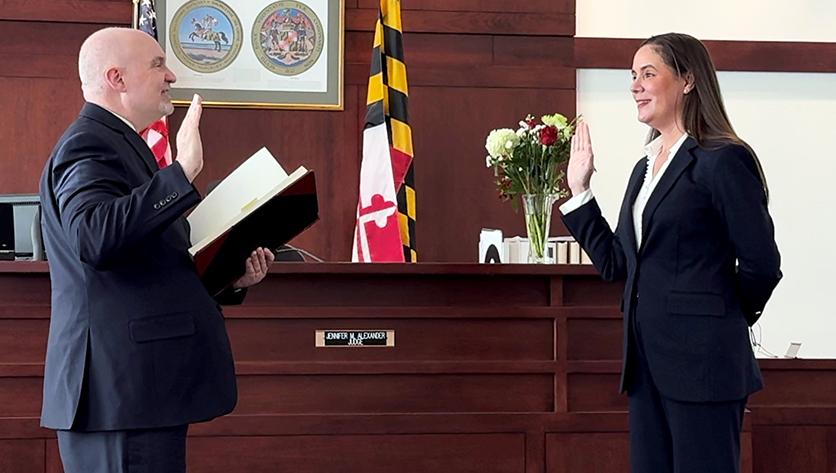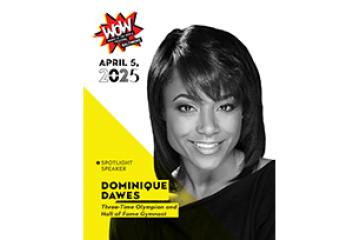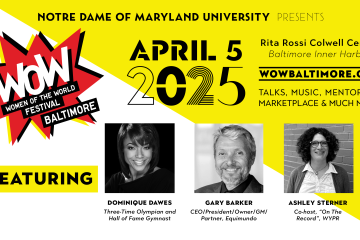Notre Dame Alumna Earns Judicial Appointment to Maryland’s District Court

By: Erik Pedersen, Content Strategy Director
BALTIMORE – Jennifer Alexander ’98 was a junior at Notre Dame of Maryland University when she first realized that she wanted to attend law school. That initial interest led to an accomplished 20+ years working as an attorney for the Anne Arundel County State’s Attorney’s Office and multiple private practices.
Alexander’s hard work was rewarded in November, when Governor Wes Moore appointed her to the District Court of Maryland for Anne Arundel County. She was officially sworn in as a judge during a December ceremony in Annapolis.
A political science major as an undergraduate, Alexander was born and raised in Missouri before her aunt, former Notre Dame president Rosemarie Nassif, SSND, Ph.D., encouraged her to move across the country to Baltimore for her college years. After graduating from Notre Dame, she earned her law degree from the University of Maryland School of Law and began working shortly afterwards as an Assistant State’s Attorney, serving as a prosecutor on the Violent Crimes Trial Team before moving to private practice.
Alexander was recognized in 2023 as a Leader in Law Honoree by The Daily Record. Her extensive community service includes spending several years supporting child witnesses with her rescue dog, Mac, as a sworn Courthouse Dog Therapy Team. Learn more below about Alexander’s career in law, the impact that Notre Dame had on her professional trajectory, and the process that led to her judicial appointment:
Had becoming a judge always been a career goal for you?
It wasn’t really on my radar until the past few years. I was doing quite well in private practice, helping build a practice from the ground up after leaving the state’s attorney’s office without a single client, but as meaningful as that work is, I was searching for something that would be more impactful to me and to the community.
Becoming a judge was something that was suggested to me as the next step to creating that kind of impact. It would get me back to what my roots were when I left college, when I had always planned to get into and stay in public service. I didn’t think I would ever leave my original role as a prosecutor. Getting back to public service was something that I thought would be more meaningful. It allows me to impact the community in a positive way, and it lets me play a part in restoring faith in our judiciary and our judicial system, which has become very important to me over the past few years.
What was the selection process like, and what was your reaction when you found out you had been chosen?
It’s quite an arduous process, as it should be. You go through a vetting process where you have 12-14 interviews with local bar associations. They all give you a rating, which then goes on to the final interview conducted by a group called the judicial nominating commission. Every county has their own commission. It’s usually 13 people, and you go interview with them in person, then they select which candidates should be forwarded to the governor for consideration. If your name is forwarded to the governor, then you sit down and have an interview with him as well. You also submit a detailed 30+ page application along with writing samples – it’s a very lengthy process.
I ultimately met with the governor and his legal counsel. After that interview, I got the call back in November from Governor Moore himself, which was quite surprising. Typically, a member of his staff would reach out, alerting you to be available for a call at a later time, but Governor Moore called me directly the week before Thanksgiving right when everything was slowing down prior to the holiday. I was over the moon. I was very humbled, honored, surprised, and grateful for the entire experience.
What are some top career accomplishments to this point that you are most proud of?
I’ve tried a number of high-profile cases, including the Annapolis Mall shooting which occurred in 2007, but the things that I’m most proud of didn’t really have anything to do with the courtroom. I started a diversity, equity and inclusion committee at my most-recent firm, McNamee Hosea, in 2020. That was the first time that they’ve had such a committee. They were so supportive of my efforts, and we were able to make a real impact in the community. That’s something I’m very proud of, and it will continue to be an important part of the firm’s culture after my departure.
My dog and I also became a courthouse therapy dog team. He’s now retired, but for a number of years he and I went through a lot of training and certifications in order to work in the courthouse together. He was trained to sit with child witnesses, to help ease their concerns about testifying. We also worked in additional community locations, including Anne Arundel Medical Center and other juvenile settings. We did a lot of work together as a volunteer therapy dog team, and I’m really proud that we were able to give back in that way.
Going back to your undergraduate years, how did you first hear about Notre Dame, and what inspired you to attend?
My aunt, Sister Rosemarie Nassif, was actually the president at the time, and she encouraged me to attend. I was born and raised in Missouri. I had never been to Maryland, and I’d never been out to the East Coast, but my aunt and I were extremely close my entire life.
I immediately connected with the community at Notre Dame. I tried out for and made the basketball team. I made friends that I still have to this day. That phone call from my aunt telling me to get in my car and drive here, without a doubt changed the trajectory of my whole life. I’m so grateful for her for starting that first step to get me to college and start working towards achieving my goals. I owe a lot to her.
Were you involved with any extracurriculars at Notre Dame?
I had a wonderful experience playing basketball. I wasn’t very good, but I loved the sport. It kept me disciplined, and it introduced me to other students. You had this built in group of friends. I got to see the East Coast as well. I had never been out east at all, so to be able to travel to Virginia, Pennsylvania, New Jersey – these were exciting things for a girl from Missouri.
My teammates then convinced me to try out for lacrosse, which is huge out here, but in Missouri we didn’t even know what it was. I made the team, just simply based on, I think, being six feet tall and otherwise in shape. I don’t know much I contributed to the team, but I very much enjoyed being a part of it. I received a spirit award at one of the banquets, which is all I needed. I couldn’t score any goals, but I could bring the team spirit. It was only for one year – I had to get a job and start working after that first year – but I had a great experience playing sports at Notre Dame.
Were there any classes or experiences at Notre Dame that were particularly helpful in preparing you for your career?
My English and history classes were extremely helpful because of the writing component. My favorite professor was Dr. Charles Ritter – we stayed in touch for a long time after I graduated. He was a history professor, and he really helped me elevate my writing, which I believe helped me not only get into law school, but to do well once I got there. There is so much required writing in law school, and that has continued throughout the course of my career.
I owe everything that helped me develop as a young woman to Notre Dame – the women that I met and the independence that I was able to feel by being a valued member of that community. Walking the halls of Meletia or any of the older buildings, you would see photos of women from the past who were real pioneers in their fields, attending college at Notre Dame when many women didn’t have the opportunity. I felt like I needed to live up to the history of those women who came before me. My time at Notre Dame was a really important part of my overall development.
Is there any message you’d like to give to current students here at Notre Dame?
The best advice that my aunt ever gave me was to find what you’re passionate about and then make that your career. That’s the way that you’re going to have the most professional fulfillment.
Perseverance is also important. Don’t be deterred if things don’t work out right away. For example, the first time I applied to be a judge I wasn’t selected. I applied again and got a little bit closer. Then I applied again for a third time, and this time I was appointed.
You have to persevere through the adversity that life is inevitably going to throw at you. It sounds cliché, but don’t give up. It’s the most basic advice one can give, but it also might be the most important. Keep trying, and with hard work and perseverance you can achieve your goals.
Established in 1895, Notre Dame of Maryland University (NDMU) is a private, Catholic institution in Baltimore, Maryland, with the mission to educate leaders to transform the world. Notre Dame has been named one of the best "Regional Universities North" by U.S. News & World Report.




